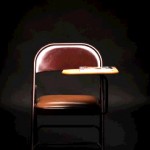Empty Chairs at Empty Tables … or Desks
There are a lot of things we can say about suicide. We can say that an attempt is a cry for help. We can discuss warning signs. For those who are struggling and contemplating, we can tell them not to give up. We can point them to hotlines and support resources.
As a teacher, I’ve had training on these things and dealt with them on various levels.
Today I’m thinking about realities I haven’t thought about before. How do you handle losing a student this way?
How do you help teachers and students who have to face an empty desk that signifies so much more than an absent classmate?
How do you comfort colleagues who think they should have seen something, done something differently, been more observant?
And perhaps the toughest one of all—how do you help students who realize they should’ve treated their classmate better?
If a student bullied another, we don’t want to say, “No, you didn’t do anything wrong.” Perhaps they need to feel that responsibility, let it serve as a drive to change. On the other hand, we don’t want to break another student when we’ve already lost one.
So what do you say to a student who’s upset because he remembers making fun of the kid who’s gone?
I really don’t know.
Some of the most eye-opening conversations have been with the in-betweeners. Kids who say, “I didn’t really know him. I saw him around. Some people were mean to him. That wasn’t cool, so I never made fun of him … but y’know … I never really tried to make anyone else stop. I should’ve.”
That goes to show there is no in-between. With bullying, if we’re not part of the solution, we’re part of the problem.
We need more solutions moving forward.


*hugs* What an awful thing to deal with. 🙁
I remember just how those kids feel. When I was in junior high, every year between 7-9 grades we lost a member of our class – the first was a suicide, one was an accident, and another was a longterm illness. I no longer remember exactly who the others were, but I’ll never forget the suicide. I was one of the kids who always got made fun of, but he was even lower than me on the social ladder. I never really liked him much, but I never made of him, nor did I have the power to stop anyone from harassing him either. I still felt guilty when he died. Most of the grade got to take a day off to go to his funeral, but I chose not to. Too many kids were doing it just to get out of school for the day, and I didn’t feel right because I hadn’t been his friend.
It was hard to untangle those feelings of shock, grief, and remorse. And honestly, I’m not sure what a teacher could have done in the aftermath to make things better aside from what they did (and what it sounds like you and your school are doing) – be there for the kids who need to talk. And not all the kids are going to want to talk (or feel they have a right to talk, like me), which makes it trickier. Even kids who didn’t know the person who died are going to grieve if only because of the shock of it. For some, it may be the first time someone they knew died and that’s always going to be difficult to grapple with. But just knowing that there’s people they can go to and who will listen can help.
*more hugs*